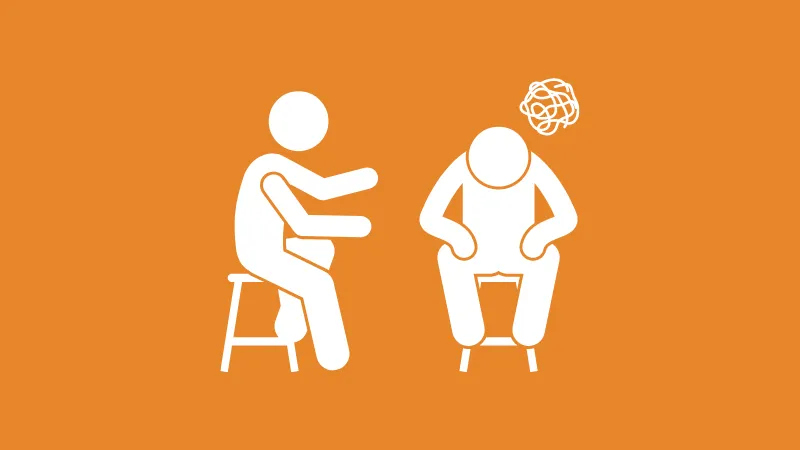Table of Contents
Affiliate link notice: As an affiliate of BetterHelp and other third-party vendors, We will receive compensation if you make a purchase using the links provided on this page. For more information, visit our disclosure page.
Last Updated on January 16, 2024 by Randy Withers, LCMHC
Over the past two years, global events have forced those battling sobriety to find different ways to manage their recovery. Often forced to work from home with no in-person 12-step meetings and therapy, alcoholics must find alternative ways to stay sober.
If you live with an alcoholic, you know how hard the road of recovery is for them. Imagine how hard it’s been for you to adapt to a stay-at-home lifestyle. Now, imagine you are doing that while fighting an addiction. That’s what your loved one is going through right now.
To that end, let’s talk about how to support an alcoholic in recovery. Your support will mean the world to them, but there’s a right way (and a wrong way) to give it.

How To Support an Alcoholic In Recovery
1. Learn About Alcoholism
Before you can support anyone, you must learn more about what they’re going through. By researching alcoholism, you’ll have a better understanding of what your family, friend, or loved one is going through. Alcoholics can’t drink in moderation. They can’t stop while you can.
For those who can have one drink, we don’t get why an alcoholic can’t. By reading up on the disorder and what it does to the body and the mind, you’ll be better prepared to talk about it and lend a compassionate ear.
Want to Learn More About Alcoholism?
Here are some resources to learn more before venturing into the rest of the article:
- Substance Abuse and Mental Health Services Administration (SAMHSA)
- National Institute on Alcohol Abuse and Alcoholism (NIAAA)
- Alcoholics Anonymous
- Al-Anon
- Mayo Clinic: Alcohol Use Disorder
- Healthline: Alcoholism
- WebMD: Alcohol Use Disorder
- Psychology Today: Alcoholism
- National Drug Helpline
2. Don’t Drink Around Them
This may seem like it goes without saying, but alcohol and drug use is up across the country due to COVID-19. With limited access to restaurants, bars, and other social events, people are hitting up liquor stores more often than ever.
If you want to drink, consider doing it elsewhere – never, ever at home around your loved one.
Even drinking when they’re not there can lead to a relapse. They can smell it. They might even see the bottles. Don’t set your loved one up for failure by not being able to go without drinking.
Find different ways to blow steam off or relax after a hard day. They will thank you for this more than you can imagine.
3. Practice What to Say
Now that you know more about alcoholism and what they are going through, begin practicing what you’ll say when you do talk about it. You want to be kind and caring. You want to be a compassionate listener. You want to let them know you’re there for them when they need you to be.
You should use “I” statements instead of generalizations. If you have questions or concerns, ask them. Don’t shy away from what you want to know. Be prepared for tough conversations at times, depending on what’s going on and where your loved one is struggling. This is why practice helps you keep your calm when supporting an alcoholic.
4. Right Place, Right Time
Your loved one is struggling with the isolation and loneliness of stay-at-home orders. They’re not used to being away from work and away from the structure that guides recovery.
Don’t surprise them with a talk about what they’re going through. Ask them when would be a good time to talk. Let them know you support them. Be sure you pick a place and time that offers privacy and quiet.
5. Be Open and Honest
If you notice your loved one struggling, it’s okay to speak up. Don’t accuse, belittle, or speak out in anger. Voice your love and concern; let them open up to you in return in those moments.
People need to feel like they are being heard. You have good reasons to resent their behavior, but if you want their behavior to change, they need to feel like they have some control over the situation. Listening to them actually helps in these situations.
By giving them some control over the flow of conversation, you’re giving them the power to accept your honesty a little easier.
6. Give Them Space
You need to hear them when they say they aren’t ready to talk or that they need space. Give them that space at that moment. Let them come to you when they’re ready.
Sometimes recovering from alcoholism requires quiet contemplation and meditation before it can discussed. If your loved one asks for that space, respect it. If anyone else lives in your home, ensuring they respect those boundaries is helpful, too.
Learning how to support an alcoholic in recovery takes a great deal of patience. It’s important to set firm boundaries, but we can do this in a way that does rob them of their dignity.
7. Build a New Routine
Everyone had to get used to new routines over the past few years. This includes you. Your loved one is struggling with this new routine as you are. Helping them set up new habits and schedules they can count on during your time together is key to aiding their recovery.
Take the time to learn what they need from a daily schedule at home. Would breakfast or lunch at a certain time help? Do they need a decompress period after “work” is over? Let them know you’ll help them set boundaries and routines you can both stick by to add stability to their new daily life.
Bonus Tip: Help Them Find Professional Support and Treatment
While many problem drinkers are able to quit cold turkey, alcoholics may need either social support and/or professional treatment to help them achieve and maintain their sobriety. An example of a social support is Alcoholics Anonymous, which is an excellent (and free) community-based option available in most communities. They also have a considerable online presence.
But many alcoholics require medically-supervised detox services, medications, and either group or individual therapy. It can be a confusing process to figure out what treatment options are available near you, so it’s a good idea to start with your primary care physician. They can make you aware of options and make referrals as needed.
Alternatively, you can go online and perform a simple Google search. Type in “Substance Abuse Treatment Near Me” and you’ll get a list of services in your community.
Recommended Online Treatment Providers
This is a brief list of services available in the US. These are paid services. As is always the case, please make decisions that are best for you:
Final Thoughts
Recovering from alcoholism is a life-long journey that happens daily. By tsking the time to learn how to support an alcoholic in recovery, you’re showing them the fight is worth it, and that you’ll be by their side no matter what.
Just remember that recovery for many is a process. They’ll need your support long after Coronavirus has come and gone. The good news is that the skills you’ve learned here will last a lifetime.
Related Articles On Alcohol and Drug Abuse
- The Rise Of Xanax: Understanding Its Popularity And Dangers
- 9 Facts You Might not Know About Porn Addiction
- 9 Effective Ways To Deal With Insomnia in Addiction Recovery
- Alcoholism and Diabetes: Is There an Increased Risk?
- The Opioid Detox Diet: 7 Foods That Ease Withdrawals
- 5 Tips to Find the Best Drug and Alcohol Rehab Post-COVID









